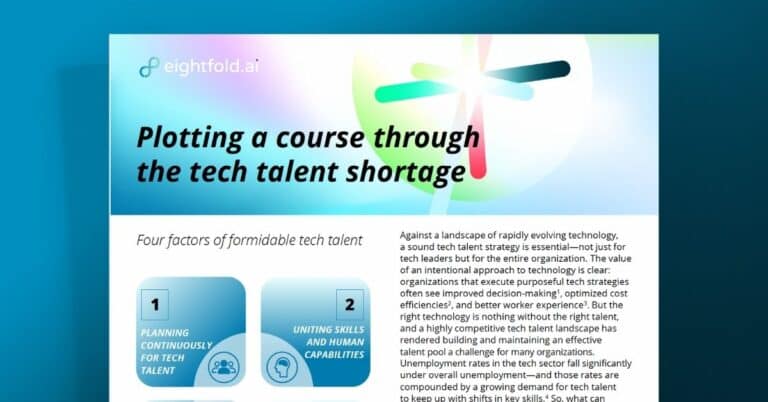
Plotting a course through the tech talent shortage
Plotting a course through the tech talent shortage
In this datasheet from Deloitte and Eightfold, you will learn how to transform your approach to tech talent, ensuring your organization can adapt to the changing landscape. A traditional, fixed model of tech talent management is no longer sufficient to meet the expanding needs of today’s world of work.
Deloitte research identifies four key imperatives that will enable organizations to navigate gaps in the workforce:
- Planning continuously
- Uniting skills and human capabilities
- Embracing an ecosystem model
- Building microcultures for macro impact
Discover how these strategies seamlessly integrate and enhance your organization’s talent transformation.
Four factors of formidable tech talent
Against a rapidly evolving technology landscape, a sound tech talent strategy is essential—not just for tech leaders but the entire organization. The value of an intentional approach to technology is clear: organizations that execute purposeful tech strategies often see improved decision-making1, optimized cost efficiencies2, and better worker experience3. However, the right technology is nothing without the right talent, and a highly competitive tech talent landscape has rendered building and maintaining an effective talent pool a challenge for many organizations. Unemployment rates in the tech sector fall significantly under overall unemployment—and those rates are compounded by a growing demand for tech talent to keep up with shifts in key skills.4 So, what can organizations do to thrive amid a vicious tech talent shortage?
A traditional, fixed model of tech talent management is no longer enough to serve the expanding tech talent needs of today’s world of work. Deloitte research identifies four imperatives to help organizations navigate gaps in the workforce and transform their tech talent strategy: planning continuously, developing skills in tandem with human capabilities, embracing an ecosystem model, and strengthening retention and development through microcultures. When combined with the Eightfold mission to pair people with possibilities and enhance intelligent talent design through the Talent Intelligence Platform, these factors have the potential to truly transform organizational approaches to tech talent.
1. Planning continuously for tech talent
Leveraging predictive modeling and artificial intelligence (AI) can help tech talent leaders forecast skill deficiencies and keep a finger on the pulse of staffing needs across the organization. These technologies can help organizations combine insights from past data analysis with real-time market trends to forecast changes in the marketplace and shape their workforce planning strategies accordingly. Predictive modeling and AI can also help organizations anticipate skill deficiencies and staffing needs before they disrupt organizational goals and outcomes.
2. Uniting skills and human capabilities
Many organizations are turning to digital playgrounds to help foster human capabilities, test new ideas, and explore new skills. Similarly, the Eightfold deep- learning AI Talent Intelligence Platform is built to give talent leaders the visibility they need into their talent pool’s skills (and skill adjacencies) so they can make the best decisions when looking for best-fit talent or identifying people to upskill. The platform uses a large global talent data set to provide clarity into internal and external talent and harnesses AI to partner human capabilities and technical skills.
3. Embracing the ecosystem
Ecosystems are truly dynamic talent models that are easily adaptable to change, but they require a concerted effort to bridge divides between full-time workers and external talent. Fostering a partnership between HR and procurement can help support a shared sense of values, commitments, and goals. Leaders should also be careful to manage the dynamics between full and part-time tech workers and ensure workers of every background are onboarded well and have the resources they need to do the job.
4. Building microcultures for macro impact
A customized employee experience allows workers to learn new skills and build career paths best suited to their individual capabilities. Many organizations are turning to tech solutions like AI to power the talent insights necessary to understand what existing employees need to perform their best and maximize their potential while delivering high-quality work to meet business objectives. Eightfold Talent Management helps HR leaders prioritize employee development by building personalized skills portfolios to identify new opportunities and career paths, courses, mentorships, and more. Employees are also put into the “drivers’ seats” of their own careers with Talent Management. They can see how their current skill sets can lead to learning new skills and advance their careers. This skills-based view empowers everyone—from HR to hiring managers to employees—to take this skills-based lens to all their talent activities.